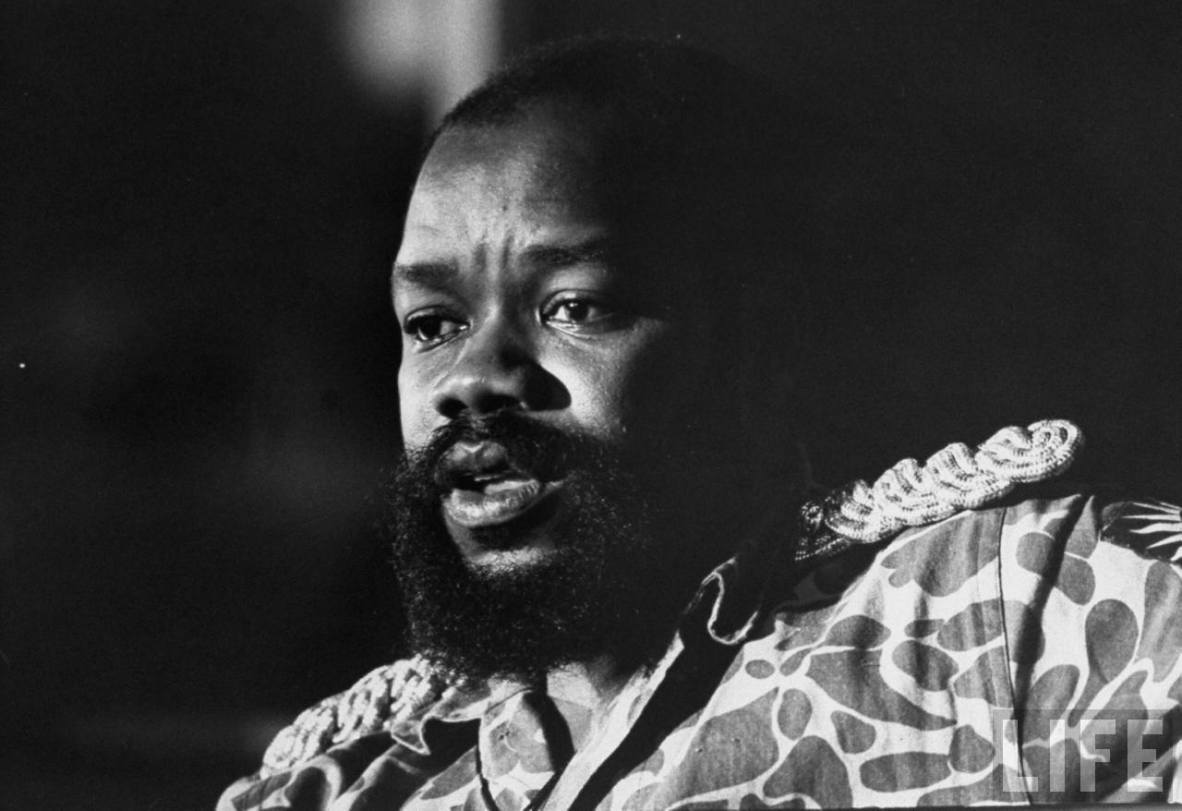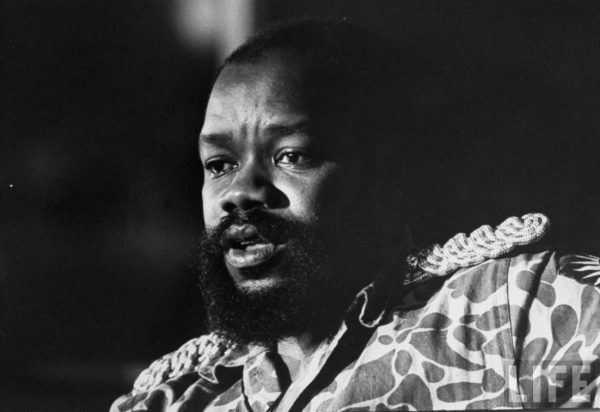The date? 4th November, 1933. The place? Zungeru, Niger state, Nigeria. The man? Chukwuemeka Odumegwu Ojukwu: Military Officer, Nigerian Politician, Biafran icon, Ikemba!
While the highlight of many greats is a rise from grass to grace,Ikemba was born in the glory of wealth and affluence, abundance of supply, with his hands in milk and teeth grit to a silver spoon. Ikemba’s father, Sir Louis Philippe OdumegwuOjukwu, was one of the most successful businessmen in Nigeria in his days. His wealth could buy as much as what life had to offer the younger Ojukwu; like the best education at CMS in Lagos, King’s college in Lagos, Epson College at Surrey England and Oxford university. But however, that wealth could not buy what Ojukwu had to offer life; a heart with vision, a man on a mission, a soul with passion.
From a Shadow, to a Servant and a Soldier

His Father desired for the younger Ojukwu to obtain quality education, rise to the ranks and take over the family business, especially given the huge ‘connections’ the Older Ojukwu had with the British colonialist. But the younger Ojukwu had other ideas. He wanted to distance himself from his Father’s wealth, move away from his Father’s shadow; basically, he wanted to be his ‘own man’; by himself, to himself. To become this, he opted for being a Nigerian civil servant. He became the assistant district officer in the town of Udi (and later on Aba and Umuahia), overseeing community development in rural areas. His ability to see, interpret and analyze complex issues gained him a reputation of a community leader; one revered and respected.
But being a civil servant was just a block in the building. Ojukwu proceeded to join the military in 1957; a decision that severed his communication with His father for another two and a half years. Ojukwu was trained in England and Ghana before returning to Nigeria in 1958 and was assigned to the Fifth Battalion in Kaduna.
Other facts about Chukwuemeka Odumegwu Ojukwu
- As a young boy in 1944, he confronted and humiliated a white British colonial teacher for assaulting a black woman. Though his actions led to his imprisonment, the event however was well spread in most of the local newspapers.
- Ojukwu met his first wife Njideka, while he was at Oxford, Englan. She was a law student at that time.
- Ojukwu was a leader in the Oxford branch of the West African Students Union during this time.
- OdumegwuOjukwu was a gifted athlete, and he made sure he honed his athletic gifts at every given opportunity. He was school captain of the rugby and soccer teams, setting the All England Junior record in the discus throw.[1]
- He had interests in drama, journalism, and like to be spotted in flashy sport cars.
- Ojukwu was the first Nigerian officer ever to attend the Joint Services Staff College in the United Kingdom.
- In 1963, OdumegwuOjukwu, as a lieutenant colonel, became the first Nigerian quartermaster-general in the Nigerian Army.
- He was one of the first and few university graduates to receive an army commission.
- ChukwuemekaOdumegwuOjukwuheaded the unsuccessful move by Biafra to secede from Nigeria.
- Ojukwuwent on Exile in Ivory Coast after the failed secession of the Biafran Republic, and was in exile until 1982, when he was pardoned to return to Nigeria.
- He ran for the Senate seat representing Anambra state under the National Party of Nigeria (NPN) in January 1983, but the bid was unsuccessful. He eventually joined the Social Democratic Party, but he was disqualified from running for president.
- In 2003 and 2007, Ojukwu ran for the office of the President of the Federal republic of Nigeria under the umbrella of the All Progressive Grand Alliance (APGA); a party he helped form. Both attempts at the elections were unsuccessfully.
- Ojukwu had several honours and titles bestowed upon him during his life, including the honorary chieftaincy titles in Nnewi,Ikemba(Strength of the Nation). The entire Igbo nation also christened HimDikedioramma(“beloved hero of the masses”). He was also fondly called ‘EzeigboGburugburu’.
- In 1994, Ojukwu married Bianca Onoh (daughter of second republic Anambra state Governor, Chief C.C.Onoh, Former Miss Nigeria and Nigeria’s Ambassador to the kingdom of Spain.
Death and Burial

IkembaOdumegwuOjukwu died on the 26th of November 2011 in the United Kingdom at the age of 78, after a brief illness. He was accorded the highest military accolade and a funeral parade was conducted for him in Abuja, Nigeria on 27 February 2012.The ceremonies before his final interment is regarded as, one of the“most unusual and elaborate weeklong funeral ceremonies in Nigeria besides Chief ObafemiAwolowo, whereby his body was carried around the five Eastern states, Imo, Abia, Enugu, Ebonyi, Anambra, including the nation’s capital, Abuja. Memorial services and public events were also held in his honour in several places across Nigeria, including Lagos and Niger State, his birthplace, and as far away as Dallas, Texas, United States.”[2]He was buried in a newly built mausoleum in his compound at Nnewi.
[1]ChukwuemekaOdumegwuOjukwu Facts, http://biography.yourdictionary.com/chukwuemeka-odumegwu-ojukwu accessed 07/11/18
[2]“At Ojukwu memorial in Dallas, USAfrica’sChidoNwangwu challenges Igbo nation to say “never again” like Jews”. USAfrica. 2012-02-06. Accessed 07/11//2018.


